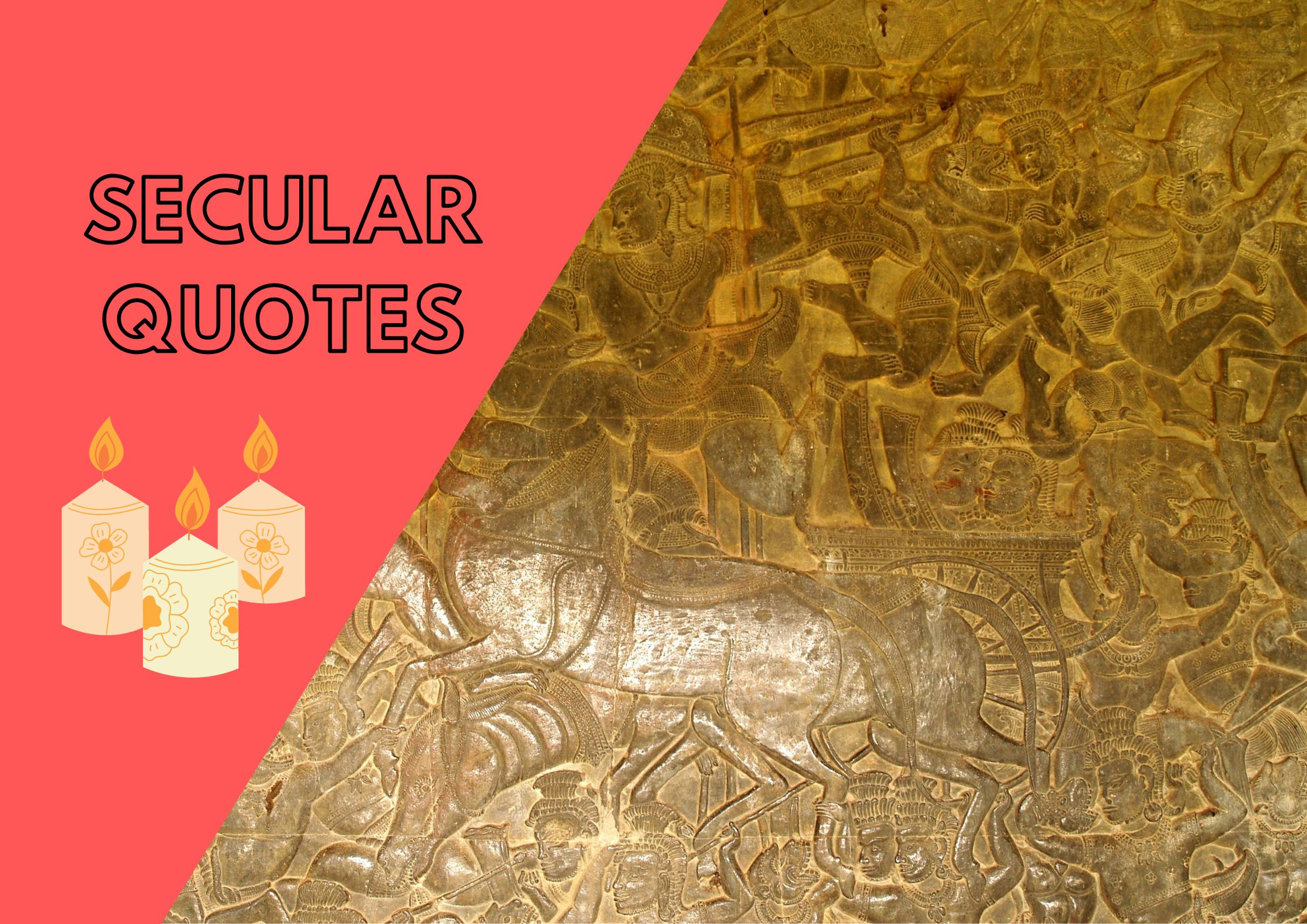100+ Secular Quotes: “Secularism is a philosophical and political principle that advocates for the separation of religious institutions from the government and the public sphere. It promotes a society where decisions regarding governance, laws, and public policies are made independently of religious beliefs or affiliations. In a secular state, individuals are free to practice any religion or hold no religious beliefs without facing discrimination. This concept is essential for ensuring religious freedom, preventing the dominance of one religion over others, and fostering a pluralistic and inclusive society. Secularism is often seen as a cornerstone of modern democracies, where the rule of law and individual rights are safeguarded regardless of religious influence.”
Secular Quotes

In a secular nation, diversity is not just accepted but celebrated
Secularism fosters a culture of tolerance and respect.
A secular society values knowledge and education.
Secularism champions the separation of church and state.
In a secular state, individuals are free to evolve their beliefs.
Secularism ensures that reason guides public policy.
A secular government represents the mosaic of its people.
Secularism is the cornerstone of civil liberties.

In a secular society, ethics transcend religious doctrine.
Freedom flourishes where secularism prevails.
Secularism safeguards the rights of nonbelievers.
In a secular nation, religious harmony is nurtured.
Secularism upholds the principle of fairness for all.
A secular state respects the diversity of worldviews.
Secularism defends the right to question and doubt.
In a secular society, the law is blind to religious affiliation.
Secularism empowers individuals to choose their own spiritual path.
A secular government does not discriminate based on belief.
Secularism is the antidote to religious extremism.
In a secular state, faith is a private matter, not a public mandate.
Secularism paves the way for peaceful coexistence.
The beauty of secularism lies in its neutrality.
Secularism protects religious minorities from persecution.

In a secular society, we find common ground amidst differences.
Secularism ensures that laws are rooted in reason, not faith.
A secular government serves the people, not a particular faith.
Secularism respects the boundaries between church and state.
Freedom from religion is as vital as freedom of religion.
Secularism is the bedrock of a just and equitable society.
In a secular state, reason prevails over dogma.
Secularism fosters unity in a world of religious diversity.
A secular government promotes fairness and impartiality.
Secularism is the guardian of equal rights for all faiths.
In a secular nation, diversity is celebrated, not condemned.
Secularism ensures that no religion is above the law.
Religion is a personal choice, and secularism protects that choice.
A secular society is a sanctuary for religious freedom.
Secularism defends the right to believe or not to believe.
In a secular state, freedom of conscience thrives.
Secularism: the cornerstone of a diverse and inclusive society.

Secularism is not against religion; it is the message of humanity.
In a secular state, religion is a private matter, and the state is neutral in matters of belief.
Secularism is the safeguard for the freedom of all religions, ensuring none dominates the state..
In a secular society, laws are made by humans, not gods.
A secular government is the protector of religious freedom for all.
Secularism promotes unity in diversity by embracing all faiths and beliefs.
A secular approach is essential for a just and inclusive society.
Secularism is the bedrock of a fair and impartial legal system.
In a secular world, reason and evidence guide decisions, not dogma.
Secularism ensures that public policy is shaped by reason, not religious doctrine.
A secular society respects everyone’s right to believe or not believe.
Secularism is the key to fostering a society where people of all faiths and none can live together harmoniously.
In a secular state, citizenship is defined by shared values, not religious identity.
A secular government protects the rights of minorities against the tyranny of the majority.
Secularism advocates for a fair and just society where beliefs are a personal matter.
In a secular nation, education is based on reason, science, and critical thinking.
Secularism is the foundation of a democratic society where every voice is heard, regardless of faith.
A secular worldview encourages open-mindedness, tolerance, and dialogue.
In a secular context, human rights are universal and not subject to religious interpretation.
Secularism fosters a culture where individuals are free to live according to their own values, within the bounds of the law.
A secular society prioritizes the common good over sectarian interests.
In a secular state, the public sphere is a neutral ground where diverse beliefs coexist peacefully.
Secularism defends freedom of conscience, allowing individuals to make choices based on their own moral compass.
A secular government ensures that public resources are distributed fairly, without religious bias.
In a secular society, citizens are judged by their actions, not their religious affiliations.
Secularism promotes a society where ethical decisions are based on reason, empathy, and shared values.
A secular perspective encourages individuals to seek common ground through dialogue and understanding.
In a secular state, governance is based on reason, evidence, and the welfare of all citizens.
Secularism is the path to a society where religious beliefs are a personal matter, and everyone is equal before the law.
A secular approach promotes a society where public policy is shaped by reason and evidence, not by religious doctrine.
In a secular nation, freedom of thought and expression are cherished as fundamental human rights.
Secularism is the foundation for a society where diversity is celebrated and respected.
A secular government ensures that public institutions serve the needs of all citizens, regardless of their religious beliefs.
Secularism protects religious minorities from discrimination and ensures their full participation in society.
In a secular state, education is a tool for enlightenment, fostering critical thinking and intellectual curiosity.
Secularism is the guarantee that the state remains impartial, treating all citizens equally regardless of their religious beliefs.
A secular society is a just society, where laws are based on reason and applied without religious bias.
Secularism supports the idea that ethical principles can be derived from human reason and experience.
In a secular nation, public spaces are inclusive, welcoming people of all faiths and none.
Secularism ensures that public resources are allocated fairly, without privileging any particular religious group.
A secular perspective encourages individuals to find common ground based on shared values and human rights.
In a secular state, religious beliefs are a personal matter, and the government remains neutral on matters of faith.
Secularism safeguards the right of individuals to follow their own beliefs or none at all.
Secularism promotes a society where citizens are united by shared values and principles rather than religious dogma.
In a secular society, ethical decisions are guided by reason, compassion, and an understanding of human well-being.
A secular approach ensures that public policies are shaped by the needs and rights of all citizens, irrespective of their faith.
Secularism defends the right of individuals to choose their own path in matters of faith and morality.
In a secular nation, public discourse is enriched by diverse voices, fostering tolerance and understanding.
Secularism is the foundation for a society where all individuals, regardless of their religious beliefs, enjoy equal rights and opportunities.
Secularism upholds the principle that religious beliefs are private matters and should not dictate public policy.
A secular perspective encourages individuals to engage in dialogue, seeking common ground based on reason and shared values.
In a secular state, governance is driven by the principles of justice, equality, and the well-being of all citizens.
Secularism fosters a culture where individuals are free to express their beliefs or non-beliefs without fear of discrimination.
Secularism promotes a society where respect for diversity and individual freedom are paramount.
In a secular nation, laws are based on reason, evidence, and the principles of justice, independent of religious doctrines.
A secular approach ensures that public spaces and institutions are open to all citizens, regardless of their religious beliefs.
Secularism defends the idea that individuals have the right to make moral choices based on their own judgment and conscience.
In a secular society, education is a tool for enlightenment, promoting critical thinking and intellectual independence.
Secularism is the foundation for a society where citizens are bound together by shared values and human rights.
Secularism safeguards the right of individuals to follow their own beliefs or none at all.
In a secular state, laws are derived from human reason and are not subject to religious interpretations.
A secular perspective encourages individuals to seek common ground through dialogue and understanding.
Secularism promotes a society where respect for diversity and individual freedom are paramount.
In a secular nation, public spaces and institutions are open to all citizens, irrespective of their religious beliefs.
Secularism defends the idea that individuals have the right to make moral choices based on their own judgment and conscience.
A secular approach ensures that public policies are shaped by the needs and rights of all citizens, irrespective of their faith.
In a secular society, education is a tool for enlightenment, promoting critical thinking and intellectual independence.
Secularism is the foundation for a society where citizens are bound together by shared values and human rights.
Secularism safeguards the right of individuals to follow their own beliefs or none at all.
In a secular state, laws are derived from human reason and are not subject to religious interpretations.
A secular perspective encourages individuals to seek common ground through dialogue and understanding.
Secularism promotes a society where respect for diversity and individual freedom are paramount.
In a secular nation, public spaces and institutions are open to all citizens, irrespective of their religious beliefs.
Secularism defends the idea that individuals have the right to make moral choices based on their own judgment and conscience.
A secular approach ensures that public policies are shaped by the needs and rights of all citizens, irrespective of their faith.
In a secular society, education is a tool for enlightenment, promoting critical thinking and intellectual independence.
Secularism is the foundation for a society where citizens are bound together by shared values and human rights.
Secularism safeguards the right of individuals to follow their own beliefs or none at all.
In a secular state, laws are derived from human reason and are not subject to religious interpretations.
A secular perspective encourages individuals to seek common ground through dialogue and understanding.
Secularism promotes a society where respect for diversity and individual freedom are paramount.
In a secular nation, public spaces and institutions are open to all citizens, irrespective of their religious beliefs.
Secularism defends the idea that individuals have the right to make moral choices based on their own judgment and conscience.
A secular approach ensures that public policies are shaped by the needs and rights of all citizens, irrespective of their faith.
In a secular society, education is a tool for enlightenment, promoting critical thinking and intellectual independence.
Secularism is the foundation for a society where citizens are bound together by shared values and human rights.
Secularism safeguards the right of individuals to follow their own beliefs or none at all.
In a secular state, laws are derived from human reason and are not subject to religious interpretations.
A secular perspective encourages individuals to seek common ground through dialogue and understanding.
Secularism promotes a society where respect for diversity and individual freedom are paramount.
In a secular nation, public spaces and institutions are open to all citizens, irrespective of their religious beliefs.
Secularism defends the idea that individuals have the right to make moral choices based on their own judgment and conscience.
A secular approach ensures that public policies are shaped by the needs and rights of all citizens, irrespective of their faith.
In a secular society, education is a tool for enlightenment, promoting critical thinking and intellectual independence.
Secularism is the foundation for a society where citizens are bound together by shared values and human rights.
Secularism safeguards the right of individuals to follow their own beliefs or none at all.
In a secular state, laws are derived from human reason and are not subject to religious interpretations.
A secular perspective encourages individuals to seek common ground through dialogue and understanding.
Secularism promotes a society where respect for diversity and individual freedom are paramount.
In a secular nation, public spaces and institutions are open to all citizens, irrespective of their religious beliefs.




















